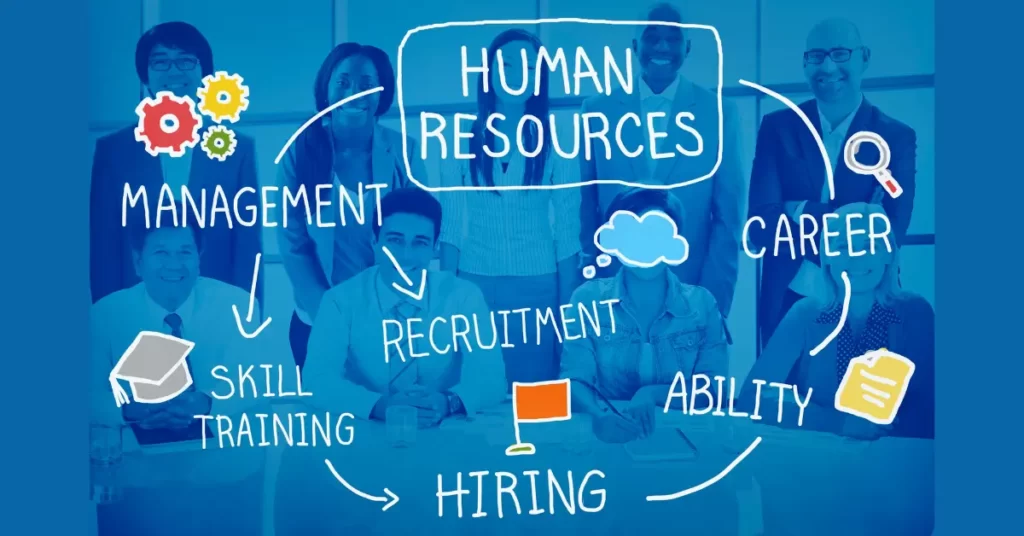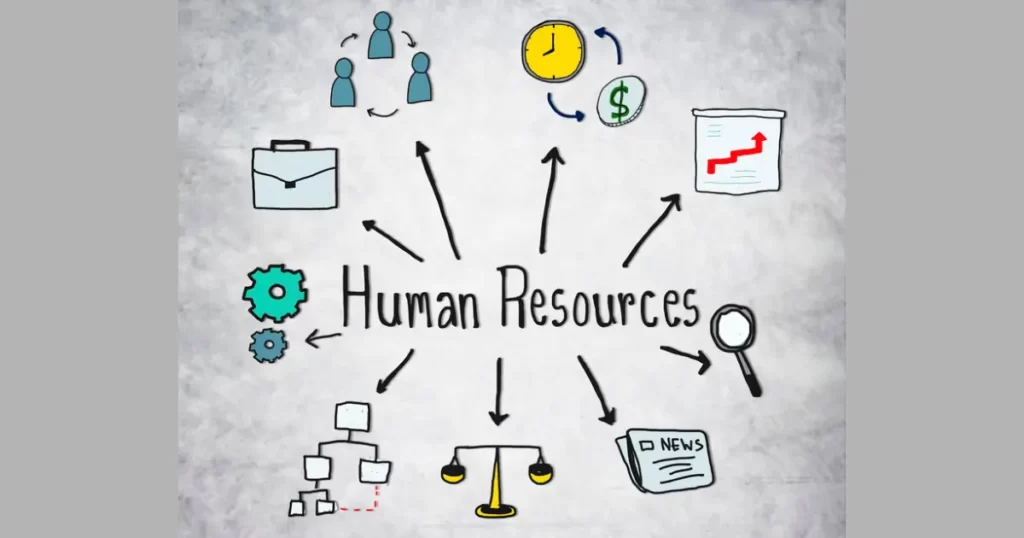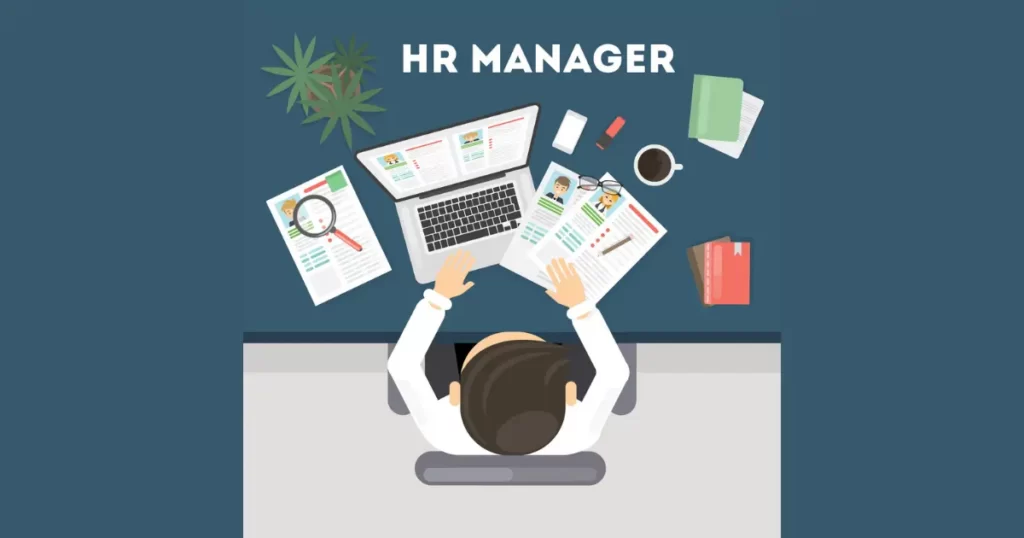Introduction
Human Resource Management (HRM) is an important component in organizational success. It involves managing the human capital within an organization to optimize their potential, productivity, and overall performance.
HRM is an important business function which effectively manages the workflow within an organization by properly utilizing its human assets for achieving their utmost potential and productivity.
HRM encompasses planning, acquiring, developing, committing and utilizing employees as requisite for the achievement of organizational goals and objectives.
It is directly associated with maintaining a productive and congenial work atmosphere and looking after employees’ well being and satisfaction.
What is Human Resource Management (HRM)?
Human Resource Management (HRM) is the strategic management of an organization’s workforce or human assets. It deals with recruitment, selection, training & development, performance management, overall well being of employees.
HRM focuses on the proper, effective and optimal utilization of human resources in order to achieve the organizational objectives and targets.

Table of Contents
The Importance of human resource management (HRM) in Organization
Human resource management is very important for the organizations for a number of reasons. First of all, HRM ensures that organizations hire the right people with the right skills and adequate qualifications to perform various tasks and jobs to make the entire workforce more efficient and effective.
Furthermore, HRM helps in employee growth, motivation and engagement that in turn ensures high level of job satisfaction and employee retention.
Human resource is the most valuable asset of any company or any business organization. A happy and satisfied employee can take the organization to the height of success.
So, HRM maintains a healthy and cordial relationship between employee and employer. It creates positive work culture in the organization. It also maintains industrial and employer-employee relation by following statutory and legal requirements.
Overall, HRM helps organizations to develop competitive edge by making optimal use of its human resources. For the overall development of any business, Human resource management must be addressed in order to get the desired results.
Through the following information we will come to know about the fundamentals of Human resource management.
Human Resource Management (HRM) definition by Authors
- Scott, clothier, and Spriegel have defined HRM as that branch of management which is responsible on a staff basis for concentrating on those aspects of operations. Which are primarily concerned with the relationship of management to employees and employees to employees and with the development of the individual and the group.
- Northcott, considers HRM as an extension of general management. And it promotes and stimulates every employee to make his fullest contribution to the business. HRM is not something that could be separated from the basic managerial function. It is a major component of the broader managerial function.
- French Wendell, defines “HRM as the recruitment, selection, development, utilization, compensation and motivation of human resources by the organization.
- According to Edwin B. Flippo, “HRM is the planning, organizing, directing, and controlling of the procurement, development, resources to the end that individual and social objectives are accomplished”.

Key Functions of Human Resource Management (HRM)
1. Recruitment and Selection
Recruitment and selection is one of the major activities of HRM. It entails the process of attracting potential employees, evaluating their qualifications and deciding whether to hire them or not.
HR professionals must employ methods like advertising, face to face interviews, testing and referral programmes to ensure that the best candidate is chosen for the job in the organisation.
2. Training and Development
HRM involves imparting skills and knowledge to employees through training and development. The objective of training and development is to enhance individual, group and organizational performance, to upgrade and maintain competencies, to satisfy career development needs etc.
Training and development activities are crucial for the growth and survival of organization. HR professionals identify the training needs of employees, organize development programmes to satisfy these needs.
They also identify appropriate methods to conduct training and development programmes, evaluate the effectiveness of these programmes and ensure continued learning for employees.
3. Performance Management
Performance management involves formulation of performance standards, providing performance feedback and appraising the performance of the employees.
HRM sets up objective performance appraisal systems that allow managers to better evaluate levels of personal and or group performance.
This process assist in the identification of areas of strength and weakness; search for the best talent from employees; and the correlation between performance and organizational objectives.
4. Employee Relations
Paying attention to the employees of an organization is also an essential factor when it comes to enhancing production of an organization. It is essential to have healthy relations between employees so as to achieve the organizational goals and objectives.
The HRM acts as a middle person between the conflicting employees in order to resolve their complaints and disputes. It encourages relationships between employees and facilitating one on one communication which helps them to be satisfied with their jobs.
5. Compensation and Benefits
HRM also makes sure that there is better and equal remuneration policy that would attract the best talent in the market.
It sets up compensation policies, manages benefits schemes, and researches on how the organization can offer competitive remuneration in the job market.
Compensation and benefits help in encouraging the employees, enhancing the level of satisfaction in an employee toward his job, and improving on the levels of retention in an organization.
HRM and Organizational Culture
HRM has a strong influence in setting and maintaining the organizational culture. It outlines the principles of conduct that shape employee’s behavior and their relationship with fellow employees and the organization.
Diversification and inclusion, teamwork, safe and respectful workplace are some of the ways through which HRM creates positive culture.
A strong organizational culture leads to higher employee morale, productivity, and overall organizational success.

HRM Challenges in the Modern Workplace
In todays changing world of business the human resource management encounters many challenges. These challenges include adapting advancements in technology, managing a multi-generational workforce, and addressing the work-life balance needs of employees.
Furthermore, there is a growing complexity of the legal framework in the field of human resources management, protection of personal data, and an increase in the need for teleworking.
In order to deal with these challenges HR professionals have to be as flexible, versatile, proactive in their approach, creative and active-mind as possible.
The Future of Human Resource Management (HRM)
Today, as organizations continue to grow in complexity, the contribution of HRM to organization success is assumed to be even bigger.
The future of HRM involves the use of IT support through, artificial intelligence, machine learning and data analytics in decision making and in the management of human resources.
HR specialists will pay attention to the strategic workforce planning, talent management, and development of top human capital in order to boost organizational growth and ensure its competitiveness.
Conclusion
Thus, it becomes clear that HRM plays a significant role in the success of an organization. According to this, the human capital can be well managed by the HRM department which leads to the satisfaction, engagement and ultimately the work performance of the employees.
The roles of HRM include recruitment, training, performance management, employee relations, compensation, and ensuring that organizations acquire, develop and maintain high performing employees.
HRM has to respond proactively and implement new strategies while facing new challenges in order to boost organisational growth and it’s continuation to emerge in the dynamic workplace
FAQs
1. What qualifications are required to work in HRM?
The following are some of the academic qualifications necessary when one is seeking a job in the field of HRM. it is however important to note that these may vary depending on the particular organization and the specific job the interested candidate is applying for.
However, there is usually a minimum educational requirement of bachelor’s degree in human resources, business administration or any related field.
Certifications like the ms in human resource management, Professional in Human Resources (PHR), or SHRM can also increase the prospects of the candidates.
2. How does HRM contribute to employee motivation?
HRM helps to motivate the employees by giving them opportunities to grow by providing them promotions, bonuses, appreciations and a healthy organizational culture.
When the employees are appreciated for their work, get fair compensation for their work output, given direction regarding their career growth then their motivation level increases which results in higher job satisfaction and performance.
3. What are the ethical considerations in HRM?
Some of the ethics of HRM include non-discrimination in hiring and promotions, respecting the rights of the employees, keeping their information confidential and observing the relevant laws and policies.
It is important for HR professionals to maintain ethical behaviors in aspects such as recruitment, employee relations, compensation and performance management amongst other tasks within HRM.
4. How does HRM support diversity and inclusion?
Diversity and inclusion are values supported by HRM because the organization believes in equal opportunities and welcomes diversity.
Some of the ways of enhancing diversity in organizations include; increasing the number of employees through a diversity method of recruitment, implementing cultural diversity sensitivity training, and encouraging employees to be diverse by establishing a supportive workplace environment.
5. How can organizations adapt HRM to remote work arrangements?
To enhance the employment of HRM in encouraging remote work deals, organizations may incorporate virtual recruitment and onboarding, virtual training and development, remote performance management, and project management tools.
Another area of focus for HRM is to consider the current trends in work organization with their special reference to remote working and other similar forms of work arrangements that can be problematic in terms of work-life balance and other factors affecting employees’ well-being.